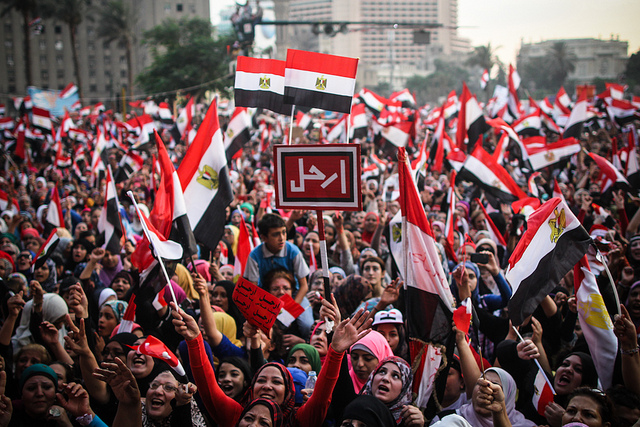Just one year after Mohammed Morsi was sworn into office, Egypt’s army responds to popular protests by deposing the democratically elected president. How did we get here and can the army be trusted to return the country to a path of democracy?
On June 29, 2012, Tahrir Square erupted in cheers as Mohammed Morsi, Egypt’s first democratically elected president, took office. On July 3, 2013, the square was once again packed with cheering Egyptians. This time, they were celebrating the military’s announcement that Morsi had been ousted, the constitution suspended and a senior judiciary figure appointed interim leader pending early elections. Meanwhile, Morsi was under house arrest.
A lot can happen in a year.
The day Morsi took office, he stood in front of the cheering crowd and opened his blazer to reveal that he was not wearing any protective gear. Stepping away from his panicked body guards, he charmed the crowd by announcing that he was not afraid because he was “one of the people.” This has always been the Muslim Brotherhood’s main claim to legitimacy — that it represents the real Egyptians. Not the city dwellers and not the liberal upper class, but the millions who live in slums, small towns and villages, struggling to make a living and adhering to a basically conservative Muslim lifestyle.
A few weeks after he took office, Morsi announced the forced retirement of several senior military officers. These included Field Marshall Tantawi, the defense minister who had headed SCAF, the Supreme Council of Armed Forces, which ruled Egypt for 18 months between the overthrow of Mubarak and the election of Morsi.
Readers might remember that the army committed many acts of tremendous brutality during that interim period. Hundreds of civilian protestors were tried in military courts and handed lengthy jail terms. Female protestors were subjected to a form of sexual assault called “virginity tests.” There was the Maspero Massacre, when the army opened fire on Coptic protestors, killing 20. There was the incident of the “girl in the blue bra,” who was stripped and beaten on the street by security forces. And so on.
No wonder, then, that so many Egyptians celebrated what they believed, or wanted to believe, was the democratically elected government asserting its authority and reducing the army’s power over the political realm. Meanwhile, some analysts warned that this was likely a back room power-sharing deal between the Muslim Brotherhood and the military.
Losing popular support
But over the following months Morsi and his Freedom and Justice party failed to capitalize on the initial popular goodwill that came flowing in their direction. In fact, they seemed to do just about everything to alienate everyone — the army, the liberals who had reluctantly voted for them (because the only other choice was a holdover from Mubarak’s regime) and even their popular electoral base.
In many cases, Morsi came across as authoritarian and incompetent. In November, for example, he announced that the presidency was above the law and not subject to judicial review. Protests ensued, with mass demonstrations in front of the presidential palace. Then Morsi retracted the announcement. On another occasion he suddenly announced massive tax increases, including huge raises in the prices of staple foods. Again, there was an uproar. And again, the announcement was rescinded — at 2 a.m., on the president’s Facebook page.
From there, things just kept on getting worse, with the government lurching from one crisis to another. There were gas shortages, electricity outages and the threat of a water crisis. Prices rose, unemployment remained high and the economic crisis worsened as tourists stayed away because the government failed to bring order and stability.
In a move that was reminiscent of Mubarak-style authoritarianism, the state’s general prosecutor charged Bassem Youssef, widely known as the Egyptian Jon Stewart, with insulting the president and Islam. Youssef, who appeared several times on Stewart’s show and recently hosted the American comedian on his own program, which he modeled after “The Daily Show,” is famous for his skits that mock Morsi.
Meanwhile organized mass sexual assaults against women continued unchecked and the government was accused on more than one occasion of deploying Muslim Brotherhood thugs to beat up opposition demonstrators.
The tipping point
But the incident that was probably the turning point for the army occurred at a June 16 conference on the Syria crisis, during which Morsi sat by silently as radical Salafi clerics referred to Shiites as “infidels.” Morsi had previously called for military intervention in Syria. The army has no intention of getting involved in Syria.
Within a few days of the conference, a mob set upon four Egyptian Shi’ite men in Giza and lynched them. This incident was one of many that highlighted a rise in sectarian tensions under Morsi’s government, which in turn led to violence that attracted international condemnation.
Meanwhile, a liberal opposition group called Tamarod (Rebel) started a campaign calling for early elections. They set up an online petition in four languages and claimed they collected 22 million signatures. And they called for mass demonstrations against the government on June 30, the one-year anniversary of Morsi taking office. Egypt watchers on Twitter began appending the hashtag #tamorod to their tweets.
As June 30 approached, there were reports from Egypt of people leaving the country, withdrawing all their money from their bank accounts and stockpiling food. Others dismissed these stories as rumor-mongering and panic.
The ousting of an elected president
But it seems that few anticipated the scope of mass demonstrations that started all over the country on June 30. The revolution had been in the doldrums for months, with many doubting the opposition would muster the energy to oppose Morsi before his four-year term was up. Several international correspondents, however, said the June 30 demonstrations were visibly larger than the ones that preceded Mubarak’s resignation. And they erupted all over the country. Waving red cards that mimicked the penalty cards soccer referees show to indicate a player must leave a game, protesters shouted many familiar slogans, like “erhal” (leave), “houraya” (freedom”) and a variation of “the people demand the fall of the regime.”
There was violence, with anti-Morsi demonstrators attacking Muslim Brotherhood offices in Cairo and other locations. People were killed. At least 46 women were the victims of mob sexual attacks in Tahrir Square; many more probably went unreported. In a grassroots effort to keep women safer, an initiative called Operation Anti-Sexual Harassment deployed volunteers in distinctive T-shirts, curated a dedicated Twitter page that collected at least 20,000 followers and updated their Facebook page with similar reports and information.
Then the army stepped in and issued an ultimatum to Morsi: resolve this political crisis within 48 hours, or we will step in and solve it ourselves.
If there was a deal between the army and Morsi, it fell apart. As Ben Hubbard wrote in the New York Times, “…the military looks out for itself above all else. It is not ideological, but is intensely politicized.”
As I describe here, Morsi and his supporters rejected the ultimatum. Which is why General Abdel Fatah al-Sisi — he’s the one who ordered the “virginity tests” carried out on female protestors — appeared on state television, wearing a uniform with his chest covered in medals, to announce that the army had deposed the government. Morsi would be replaced by the chief justice of the Supreme Constitutional Court, Adli Mansour, who will be the interim president pending elections.
Then the army moved in to raid and shut down Al Jazeera Arabic’s broadcast from Cairo, mid-broadcast, because Al Jazeera Arabic is regarded as biased toward the Muslim Brotherhood. They also shut down the Muslim Brotherhood’s TV station, Misr 25, even as they arrested at least 38 Muslim Brotherhood leaders. And as mentioned above, Morsi is under house arrest.
Can the army be trusted?
These repressive measures could be a red flag signaling the army’s intention of once again imposing a military dictatorship over Egypt, but most liberal Egyptians are cautiously optimistic. Many felt — and feel — that Morsi had become an elected autocrat who had to be gotten rid of. And if it took the army to get that job done, then so be it.
Now they hope for elections that will bring non-Islamist candidates to power. But in order for this to happen, the opposition will have to get organized — form parties, field candidates and articulate political platforms. So far, they have not succeeded in doing so. Which is why the Muslim Brotherhood, which has had 85 years of experience in political organizing, was so successful in the elections.
Many analysts are now warning of a crisis in the making. Egypt is deeply polarized. The Muslim Brotherhood, which was repressed and persecuted for years, has a legitimate grievance: their party was democratically elected, and has now been booted out of office by non-democratic means. In a speech the day before he was deposed, Morsi said he would give his blood for Egypt. One hopes he was only speaking metaphorically.
Meanwhile, there is another question: how is it that so many astute, seasoned Egypt analysts were so wrong in assessing the mass popularity of the Muslim Brotherhood? Only a small percentage of the millions who demonstrated over the past few days came from Egypt’s small elite. Most were from “the people” that Morsi claimed to represent – the conservative, religious Egyptian majority. His voter base. Perhaps they would have stayed loyal to Morsi if they had prospered under his rule. But when your country is almost on its knees under the weight of a major financial crisis, there is no gas for the car and no money to buy food, political allegiances change pretty quickly.
Related:
Between admiration and cynicism: Mixed opinions of the Egyptian revolution in Israel


